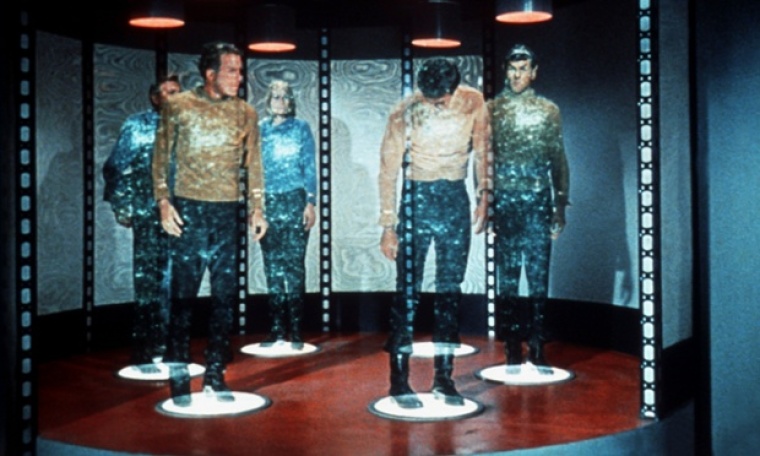Teleporter Invented: German Scientists New 'Teleporter' – But Not Exactly Of The 'Star Trek' Kind

German scientists have invented a new system that destructively scans objects and transmits the data through encrypted communication across any distance and rebuilds them in another location. The virtual "teleporter" system was developed by inventors from the Hasso Plattner Institute.
The inventors explained that what the system can do is not exactly teleportation as featured in Star Trek movies, adding that the technology relies on destructive scanning and 3D printing, according to the Guardian.
In a paper submitted for the Tangible, Embedded, and Embodied Interaction conference at the Stanford University in California, the six-member team of scientists noted that the system enables an object to be scanned layer-by-layer at one end of the system and transmitted to another station.
"(It creates) a scan per layer which is then transmitted through an encrypted communication to a 3D printer. The printer then replicates the original object layer by layer, effectively teleporting an object from one place to another," the paper explained.
"We present a simple self-contained appliance that allows relocating inanimate physical objects across distance. Users place an object into the sender unit, enter the address of a receiver unit, and press the relocate button," the group added.
The team of scientists said the system, dubbed as "Scotty," is vastly different from other systems that merely copy physical object as its layer-by-layer deconstruction and encrypted transmission ensures that only one copy of the object exists at any one time, according to the scientists.
The new system may not be able to actually teleport an object from one location to another like what fans see on Star Trek, but the scientists are optimistic that the breakthrough could be key for companies wishing to sell goods via home 3D printers.
"Real-world applications are pretty short for this kind of destruction and reconstruction. But the encryption, transmission and 3D printing objects could be key for companies wishing to sell goods via home 3D printers, ensuring only one copy could be made per purchase – effectively digital rights management for 3D printed objects," the Guardian said.
 Christians don't have to affirm transgenderism, but they can’t express that view at work: tribunal
Christians don't have to affirm transgenderism, but they can’t express that view at work: tribunal Archaeology discovery: Medieval Christian prayer beads found on Holy Island
Archaeology discovery: Medieval Christian prayer beads found on Holy Island Presbyterian Church in America votes to leave National Association of Evangelicals
Presbyterian Church in America votes to leave National Association of Evangelicals Over 50 killed in 'vile and satanic' attack at Nigerian church on Pentecost Sunday
Over 50 killed in 'vile and satanic' attack at Nigerian church on Pentecost Sunday Ukrainian Orthodox Church severs ties with Moscow over Patriarch Kirill's support for Putin's war
Ukrainian Orthodox Church severs ties with Moscow over Patriarch Kirill's support for Putin's war Islamic State kills 20 Nigerian Christians as revenge for US airstrike
Islamic State kills 20 Nigerian Christians as revenge for US airstrike Man who served 33 years in prison for murder leads inmates to Christ
Man who served 33 years in prison for murder leads inmates to Christ


 Nigerian student beaten to death, body burned over ‘blasphemous’ WhatsApp message
Nigerian student beaten to death, body burned over ‘blasphemous’ WhatsApp message 'A new low': World reacts after Hong Kong arrests 90-year-old Cardinal Joseph Zen
'A new low': World reacts after Hong Kong arrests 90-year-old Cardinal Joseph Zen Iran sentences Christian man to 10 years in prison for hosting house church worship gathering
Iran sentences Christian man to 10 years in prison for hosting house church worship gathering French Guyana: Pastor shot dead, church set on fire after meeting delegation of Evangelicals
French Guyana: Pastor shot dead, church set on fire after meeting delegation of Evangelicals ‘Talking Jesus’ report finds only 6% of UK adults identify as practicing Christians
‘Talking Jesus’ report finds only 6% of UK adults identify as practicing Christians Mission Eurasia ministry center blown up in Ukraine, hundreds of Bibles destroyed: 'God will provide'
Mission Eurasia ministry center blown up in Ukraine, hundreds of Bibles destroyed: 'God will provide' Church holds service for first time after ISIS desecrated it 8 years ago
Church holds service for first time after ISIS desecrated it 8 years ago Burger King apologizes for 'offensive campaign' using Jesus' words at the Last Supper
Burger King apologizes for 'offensive campaign' using Jesus' words at the Last Supper Uganda: Muslims abduct teacher, burn him inside mosque for praying in Christ’s name
Uganda: Muslims abduct teacher, burn him inside mosque for praying in Christ’s name